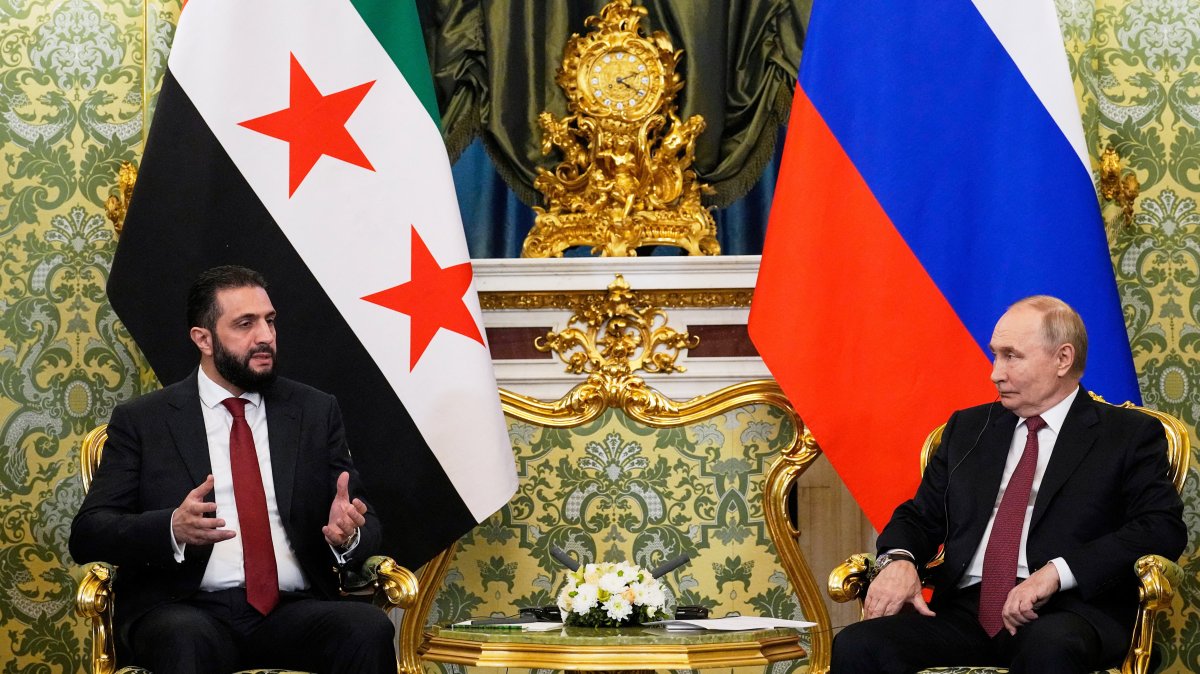Russia’s grip on Syria remains firm, even as leadership shifts in Damascus. Syrian President Ahmed al-Sharaa’s visit to Moscow in October 2025 reaffirms that the Kremlin has no intention of loosening its hold on one of its most vital Middle Eastern allies.
When al-Sharaa met Russian President Vladimir Putin in Moscow this October, it was a moment of quiet recalibration between two men who, not long ago, stood on opposite sides of a brutal war. Al-Sharaa, who led the rebel alliance that ousted Bashar Assad in December 2024, arrived seeking to rebuild bridges with a country that once helped his enemy survive. Despite that painful history, both leaders now understand that cooperation, however uneasy, is essential for Syria’s recovery and Russia’s continued influence in the region.
Al-Sharaa’s rise to power was largely backed by Türkiye, which has long played a nuanced role in the Syrian conflict and supported Syrian society in the face of brutality, famine and poverty. Ankara has positioned itself as a regional power broker, balancing relations with both the West and Moscow while pursuing its own security and economic interests. Al-Sharaa’s pragmatic foreign policy seems to echo this balance: One that prioritizes regional stability, reconstruction and reduced Iranian dominance in Syria. This convergence gives Moscow a reason to engage with the new leadership, even if it means adjusting old loyalties.
Russia’s involvement in Syria reaches back to the Soviet era. The relationship survived the Cold War and deepened during the Syrian civil war, when Moscow’s 2015 intervention turned the tide in Assad’s favor. That intervention was never just about saving a regime: It was about protecting Russia’s foothold in the Mediterranean. The Tartus naval base and Hmeimim airbase remain critical to Moscow’s power projection and diplomatic reach.
Al-Sharaa’s visit marks the beginning of a different kind of relationship. He assured Putin that Syria would honor existing agreements but also emphasized his intention to redefine the partnership on more equal terms. His request for the extradition of Assad, who fled to Russia after his fall, was a symbolic gesture of sovereignty. Hosting both the former and current Syrian leaders may appear awkward, but it perfectly illustrates Russia’s enduring leverage and Syria’s limited room for maneuver.
Yet this is not Assad’s Syria anymore. Al-Sharaa’s government seeks a more balanced path: One that maintains Russian ties without falling back into dependence. Syrian relations with Russia will never return to the patron-client dynamic of Assad’s era. Instead, Al-Sharaa envisions a multidimensional foreign policy, preserving cooperation with Moscow while cautiously rebuilding channels with Western and Arab partners. It is a delicate dance between necessity and autonomy.
For Moscow, Syria remains more than a military outpost; it is a stage on which Russia can still project power despite its isolation after the invasion of Ukraine. Through Syria, the Kremlin signals that it continues to shape Middle Eastern outcomes and can still speak the language of influence and intervention. The country also serves as a proving ground for Russia’s weapons, tactics and strategic endurance.
Economically, Moscow’s footprint is expanding through energy, mining and infrastructure contracts, converting battlefield issues into long-term leverage. For Russia, this ensures continued relevance; for Syria, it offers a fragile lifeline amid economic collapse and social exhaustion.
Both nations are learning to navigate a new reality. Russia needs Syria as a symbol of global reach, while Syria needs Russia as a shield against isolation and instability. But unlike the past, this relationship is no longer built on blind loyalty. It is built on calculation, caution and a shared understanding that survival, political or strategic, depends on compromise.
In this evolving chapter, Russia won’t let go of Syria, not because it loves Damascus, but because it needs it. And al-Sharaa, in turn, won’t reject Moscow, because he cannot afford to. Between them lies a fragile partnership, shaped by pragmatism, scarred by history and sustained by the enduring logic of power.

